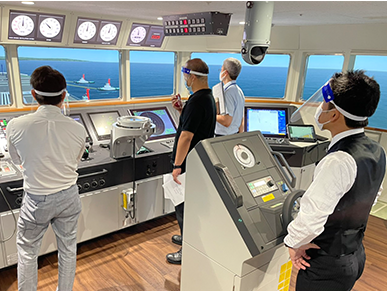For ensuring safe and smooth operation of vessels, seafarers must have an extensive range of knowledge and skills, including about: medical care, management of food and water, treatment of human sewage, waste disposal and many other systems related to daily living; as well as operation and maintenance of radio communication systems and equipment, main engine for propulsion and its auxiliary machineries, various precision instruments for measuring and control, hydraulic machineries; global geography and climate, astronomical /meteorological phenomena and their effect on vessels and cargo, and so on.
Although this is too extensive to understand completely, but it is all essential.
Therefore, it is important to develop organized systems to input all necessary skills and knowledge for our crew effectively and to keep the system and contents updated constantly.
To this end, we are promoting the following projects and programs to further enhance the ability of our valued seafarers.
Establishing the Seafarer Training Team
To increase our focus on maintaining and improving quality of our crews, we established the Seafarer Training Team in April 2022. The principal role of this team is to ensure certain ability of our seafarers through developing an organized training and promotion system and its' implementation, appropriate screening by rank when hiring and promoting the crew to higher ranks.
The team is carrying out the following activities in order to help crewmembers overcome weaknesses and update their knowledge and skills.
BRM+P Training
Effective teamwork with a pilot for bridge resource management (BRM) and maneuvering require a high level of skills supported by adequate knowledge, techniques and mental strength, and represent basic abilities to underpin safe navigation.
In response to the accident caused by a large ore carrier during berthing operation in 2020, we began to implement a new simulator training program for maneuvering as part of the measures to prevent a recurrence.
In addition to lectures and ordinary maneuvering practice with simulators, we created a mock drill featuring a reality-based dangerous situation involving un-safe act by the pilot, based on a real or near-miss incident occurring in Berthing/Un-Berthing operations, and conducted it with an experienced pilot giving appropriate guidance to the trainees. These training activities serve to ensure safe navigation in real operations.

Providing In-house Seminars
We need to constantly update necessary information for our crew, such as new regulations applicable, latest social trend, industry demands and the Company's activities in response to various incidents or events that have occurred on other vessels and related lessons to be learned, as such situations emerge one after another during our continued activities.
While accumulating such information to increase its know-how, the Company should share it with crews without delay for the purpose of ensuring safety and implementing appropriate improvements.
However, simply providing publications and paper based notices to crews do not work well for this purpose.
Therefore, we give in-house seminars to effectively communicate the above information to crewmembers. Specifically, video descriptions on different topics are created and distributed by related departments so that the entire crew, both on and off duty, can view the programs.
The Company asks each crewmember to submit opinions and comments about each program they have viewed, and gives feedback to those submissions. Through these activities, we engage in ongoing dialogues with crews, looking to keep crewmembers updated on work-related knowledge and raising awareness.


